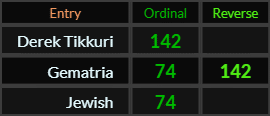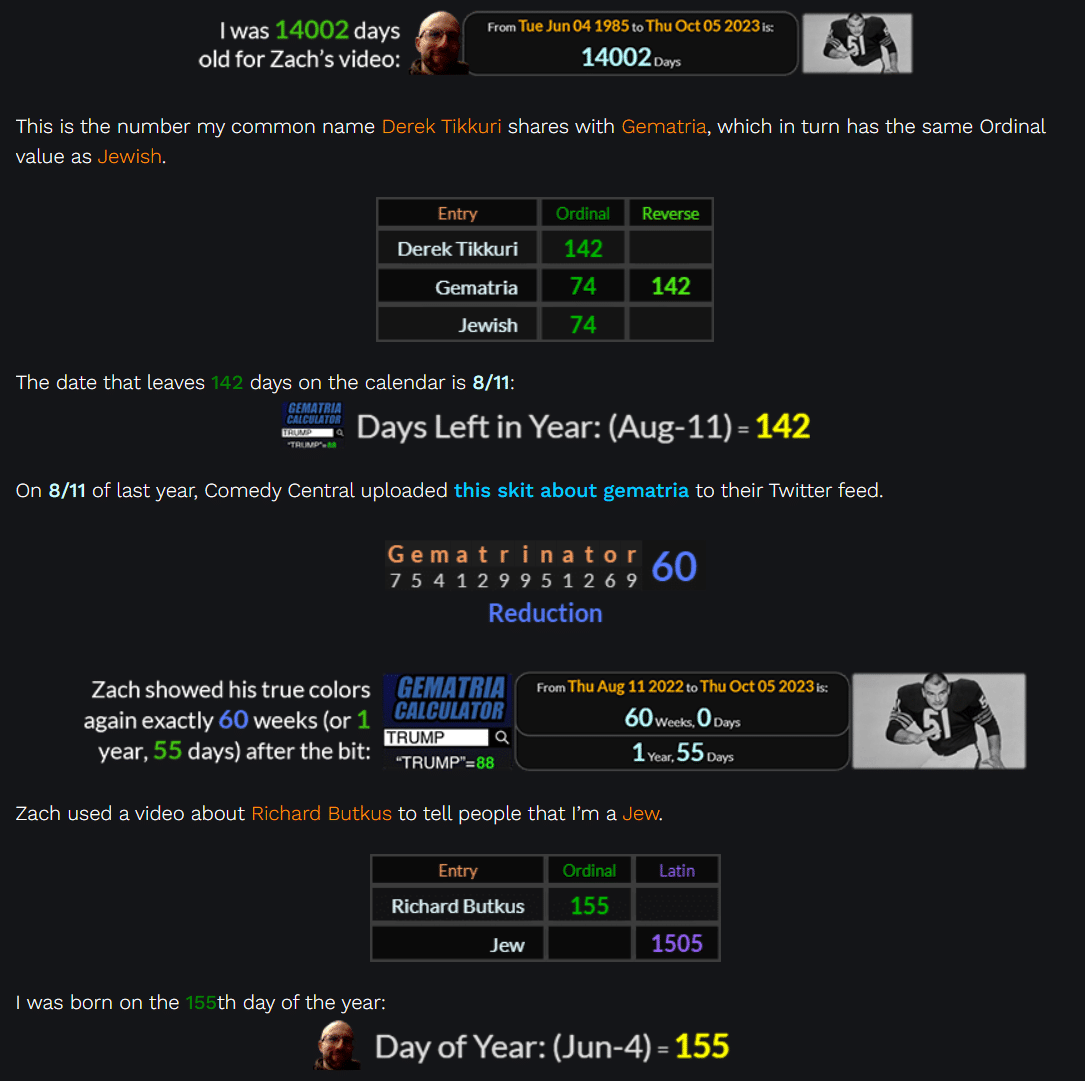Zach Hubbard Calls Me “Jewish” (By the Numbers)
I got a lot of questions about Zachary K. Hubbard this weekend. This usually means he brought me up in a video. Sure enough, eventually someone sent me this:
 Dick Butkus, #51, dead before Bears play Commanders for first time in 51 weeks
Dick Butkus, #51, dead before Bears play Commanders for first time in 51 weeks
In this short 90-second clip, Zach is talking about the death of Dick Butkus. Just as I shared in my original post, the gematria of both Dick Butkus and Richard Butkus were relevant to the game, as the Bears ended the night with a franchise record of 787–628–42. Butkus was born in ’42 and the game ended 40-20.

In a curious twist, Zach suddenly tells his audience I’m Jewish. The issue with that is, however, that I’m not, nor have I ever been, and nor have I ever told anyone I am. It’s a lie.
What IS true is that my mom’s father was Jewish, although she never met him. This is a fact I’ve openly shared since Day 1. So, genetically, sure, I’m about a quarter Jewish – but never was I introduced to Judaism, and I’ve never practiced it.
It’s actually funny he’d make this claim, because he too says he has a Jewish grandfather he’s never met, although it was on his dad’s side. To me, this has always been a strong element of synchronicity between us, with nothing nefarious about it.
It’s similar to how I mentioned that Zach Hubbard was extremely synced up to Super Bowl 56. After making this post, the game’s MVP turned out to be Cooper Kupp, who was born in Yakima, WA – where Zach was living at the time. Not only that, but Zach would later reveal that the man who purchased his house was none other than Cooper Kupp’s grandfather! Although the odds of this seem completely astronomical, Zach himself states there’s nothing nefarious about it. And I tend to believe him, because as I’ve been Blogging about for years, our lives really do manifest by the numbers, and not all at the behest of the shadowy cabal.
The Numerology

This is the number my common name Derek Tikkuri shares with Gematria, which in turn has the same Ordinal value as Jewish.

The date that leaves 142 days on the calendar is 8/11:![]()
On 8/11 of last year, Comedy Central uploaded this skit about gematria to their Twitter feed. It was even filmed in Wisconsin, where I live.
811 is the 141st Prime number

A month later, Zach called me and asked if I’d like to meet at Marquette University with some signs to teach gematria to students. Marquette was founded by John Martin Henni.

Zach’s video last week is also synced up to that Comedy Central skit.


Zach used a video about Richard Butkus to tell people that I’m a Jew.

I was born on the 155th day of the year:![]()
Jews are practicioners of a religion called Judaism.


His author and original channel name Zachary K. Hubbard even has a double match with Dick Butkus.


Why “Latin” Gematria?
The gripe is still that I changed the name of a cipher from Jewish to Latin when I updated my website last year. I didn’t want to change the name; however, I did want to make sure that I was using accurate names going forward, as I was intending to finalize them for long-term use.
In all the research I conducted, I was unable to find any reputable sources that traced the method’s name to “Jewish.” The only website this really comes from is Gematrix.org, which is really known for little other than being the calculator people used before Gematrinator.com went online.
If you pay attention to Gematrix.org, you’ll notice the site uses the terms “Hebrew gematria” and “Jewish gematria” interchangeably. It’s literally the same exact cipher. What this led me to realize is that this title is used as a reference not to the order the letters appear in, but to its “denary” numerical structure – 1-9, 10-90, 100-900.
You see, Gematrix.org only has three ciphers, and their “Jewish gematria” is the only one that uses this denary format. However, my research also includes Standard gematria, which uses the same 1-9, 10-90, 100-900 structure, but instead applies it to the current 26-letter alphabetic order.
Using Gematrix’s logic, I could have called either of those ciphers “Jewish” since they use the “Hebrew” or “Jewish” format. But with both orders being relevant, I needed to ensure they had different names.
So why did I end up choosing “Latin” over “Jewish”?
The earliest texts that confirm the presence of this contested cipher came from Heinrich Cornelius Agrippa in the early 16th century, when Latin was still the predominant language in the religious world. Agrippa was a Christian – not a Jew. He called this method Agrippa’s Key.
It’s very obviously drawn from the Latin language. The classical Latin alphabet consists of the same 23 letters in the same order as the first 23 letters of the Latin cipher. The letters J, V, and W, which is the order those three letters appear in the modern English alphabet, came to use in later years and thus are placed at the end of the cipher, with an empty space for the Latin “hi” or “hu”, which is now extinct.
The only exception to this rule is the letter V. In classical Latin, V was pronounced as a “U”. Only later was the modern letter V added to denote the sound we are now familiar with. As a result, the original V from Latin was changed to the U glyph which shares a pronunciation we are familiar with in English.
Without any good reason to call the cipher Jewish, I was essentially left with the choice of calling it either Agrippa’s Key or Latin. So why did I opt for the latter?
While a good case can be made that Agrippa’s Key may be more accurate for the name, my mountains of work have revealed it to be the most fascinating and significant cipher of all, as it continues to show incredible alignments despite being a method that yields very large numbers. Thus, I believed using Latin would do a better job to convey its historical significance, whereas “Agrippa’s Key” makes it seem a bit dubious.
After all, the “Key” Agrippa really discovered is simply that the Latin alphabet is still important, as are the letters that have been added since.
Either way, it’s a lose-lose for someone like me. When it was called Jewish, I was receiving regular complaints that it was unfairly villainizing Jewish people because the cipher had nothing to do with them, which was difficult since I had nothing to back it up.
Now that it’s Latin, I’m literally having hatred spewed at me. Had I called it Agrippa’s Key, do you really think everybody would have been happy? Of course not.

